A fresh shift in the landscape of online shopping is upon us. The way European consumers are shopping and searching for products is undergoing a notable change, and it’s one you can’t afford to ignore.
The rise of direct-to-site shoppers
According to a recent whitepaper by Internet Retailing in association with FactFinder, a staggering 55% of European shoppers now head directly to a retailer’s site when searching for products online1, rather than search engines and social platforms. This highlights the vital importance of a brand’s on-site experience in 2023 and beyond.
One of the key drivers of this change, as uncovered in the whitepaper, is the impact of AI on product discovery and search. As retailers refine their AI algorithms and offer more personalized shopping experiences, consumers find it more efficient to go straight to the source.
Download the whitepaper for the full data and insights: Intelligence by design: how companies and shoppers are reacting to the rise of AI in product search
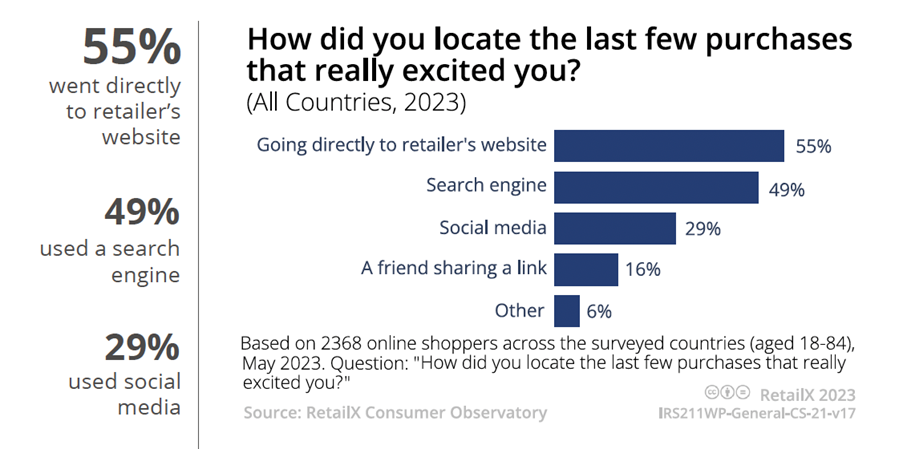
The evolution of AI in product discovery: from convenience to AI-powered precision
In the early days of eCommerce, product discovery was all about convenience. Shoppers either typed in keywords or browsed through categories. However, this approach often lacked personalization, understanding the individual preferences and needs of customers. Remember those frustrating moments of receiving zero search results due to typos or synonyms?
Enter AI. The technology brought about a significant turning point by providing businesses with insights into customer preferences. By analyzing data like browsing behavior, purchase history, and shopper intent, AI began generating highly accurate and contextually relevant search results and recommendations. This level of personalization transformed the product discovery experience, significantly boosting sales revenues.
However, as AI has become increasingly prevalent, it’s no longer just a ‘nice-to-have’. It’s the expected standard in today’s fierce market, setting the bar high for customer expectations. Brands that don’t adapt might just find themselves left in the digital dust.
Why are shoppers bypassing search engines and social media?
The shift of 55% of shoppers heading directly to retailer sites indicates a growing trust in brands and their AI-powered search capabilities. As retailers fine-tune their algorithms, the on-site shopping experience has become a lot more efficient and personalized. Shoppers know they can find exactly what they want quickly and easily, tailored to their preferences.
This level of 1:1 personalization isn’t possible through search engines or social platforms, especially now with tighter privacy controls in place, the cookie demise and iOS14.5 tracking restrictions. This is encouraging shoppers to go straight to retailers’ sites.
Recommendations: The silent salesmen
The on-site shopping experience is further boosted by product recommendations. Product recommendations have become much smarter thanks to the advent of AI, presenting the customer with similar or complementary items from the catalog that they are most likely to respond to, based on their current session or past behavior. This not only boosts the customer experience, but also greatly increases upsell and average-order-values (AOVs) for retailers.
The whitepaper revealed that the majority of online shoppers surveyed (88%) found these recommendations helpful. And relatively low numbers of shoppers felt that recommendations ‘get in the way’ (5%) or ‘don’t notice them’ (6.7%).
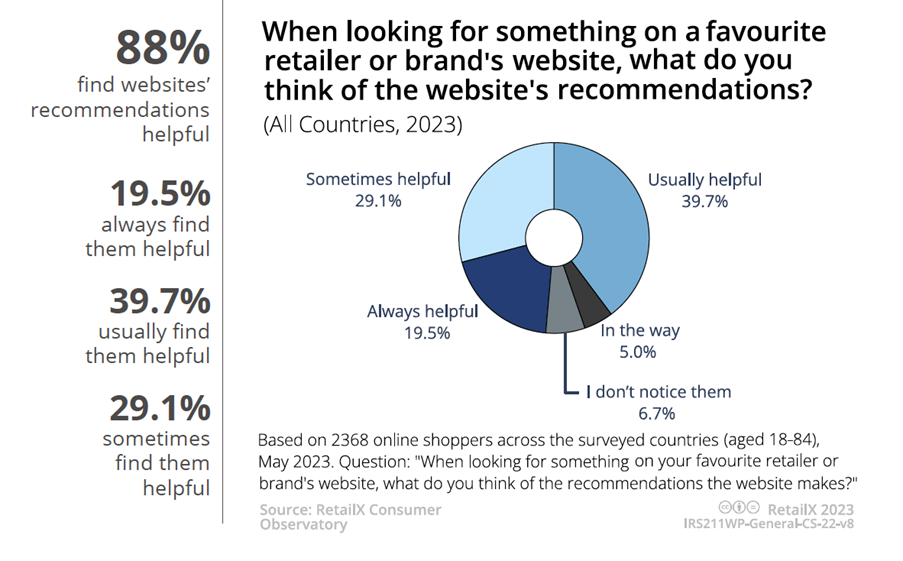
Dealing with dead end searches
Experiencing ‘zero search results’ is the bane of eCommerce search, not only for the shopper but also for the eCommerce teams having to continually keep on top of this. The whitepaper survey uncovered that nearly a quarter of all shoppers (22%) will immediately abandon their original search and try another website – resulting in a significant amount of lost sales.
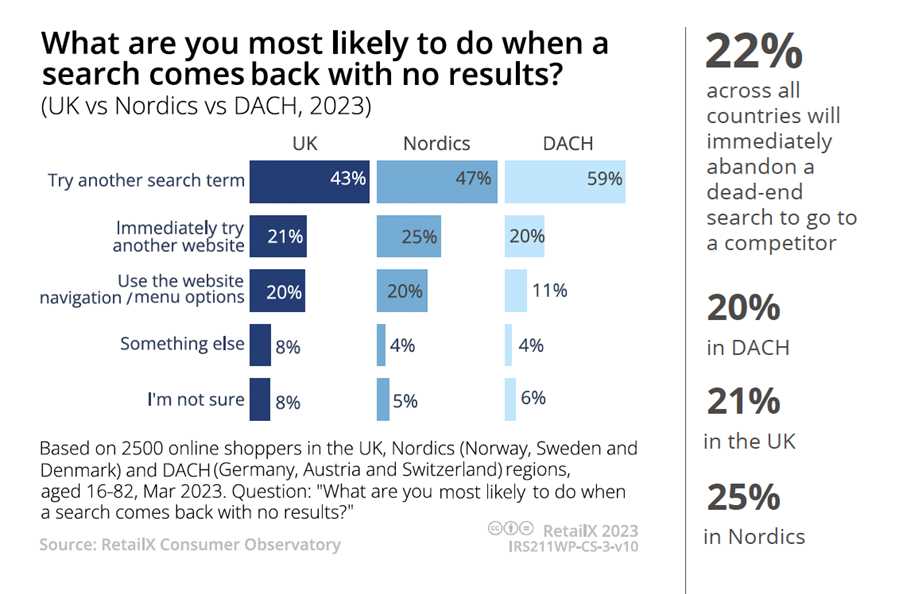
AI has transformed how eCommerce platforms handle search queries to minimize zero search results. AI models can now understand the context and intent behind a search query rather than just matching keywords. This allows the search engine to provide results that are contextually relevant even if the exact keyword isn’t present in the product listing. AI can also understand misspelled search terms, ensuring that minor typos don’t lead to ‘no results’. It can also provide autocomplete suggestions based on popular searches, making it easier for shoppers to find what they are looking for.
In addition, sophisticated AI models can recognize synonyms and related terms. FactFinder recently launched GPT Synonyms which uses the intelligence of Large Language Models (LLMs) to enable eCommerce managers to automate synonym creation. Reducing the time and resources needed to create these manually, whilst also ensuring there are fewer zero search results by helping to surface relevant products.
Search habits uncovered
- Search bar vs navigation: 61% typically go straight to the search bar, while 42% navigate via menus. (Multiple choice)
- New and trending: 27% of shoppers look at what’s new, and 18% at what’s trending.
- Patience in product hunt: Surprisingly, 53% of shoppers across Europe are willing to explore 3-5 product pages on a single site to find their desired item.
- Query type: 68% tend to use just a single keyword. Only 30% pose a question to the search bar.
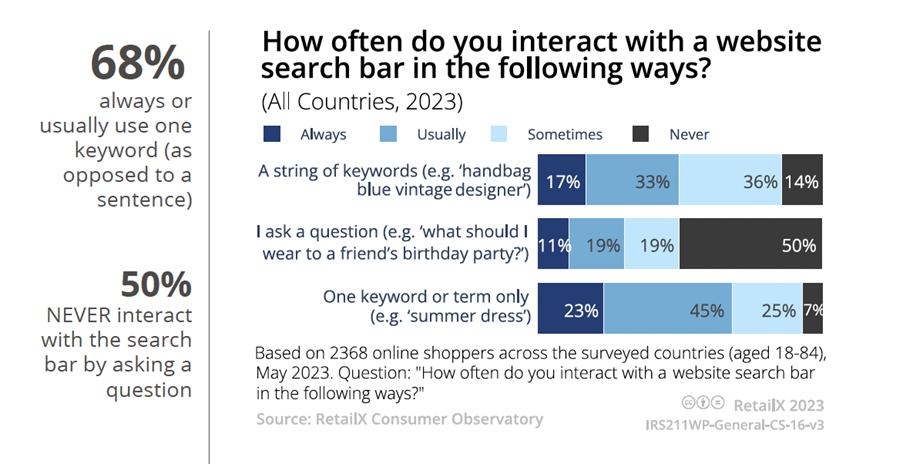
Rinse, repeat
Lastly, don’t dismiss the power of repeat purchase suggestions, especially in the fashion and grocery industries. 34% across all countries and a staggering 51% in UK, find it helpful when a grocery company they have brought from suggests they buy more/again. 35% of people surveyed across all countries found it helpful in retail.
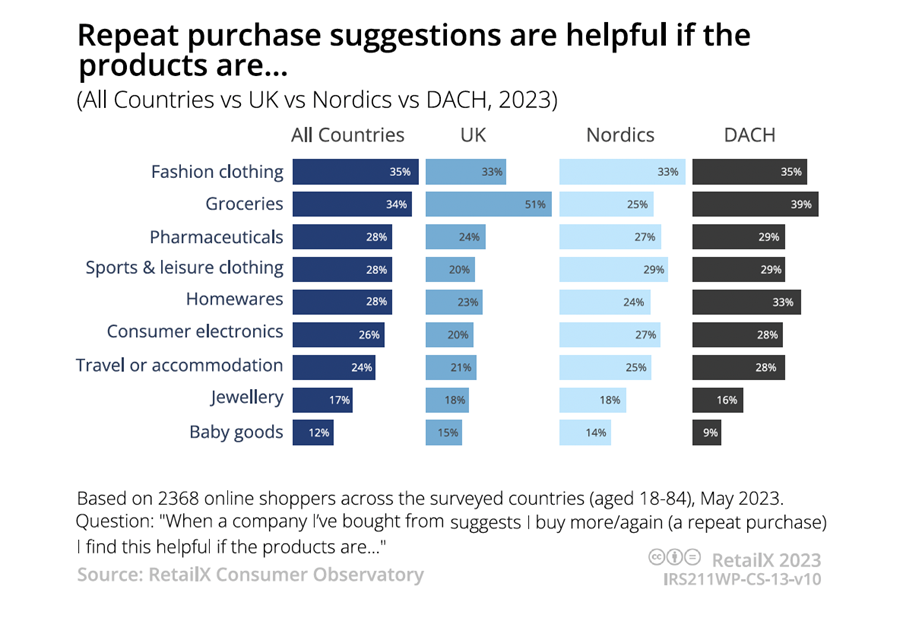
In conclusion
The 2023 online shopping scene in Europe is characterized by direct website visits, a spotlight on AI-powered personalization, and a notable appreciation for on-site recommendations. Retailers and brands need to focus on enhancing their on-site experience, capitalizing on this shift, and ensuring that their website is equipped to cater to these evolving preferences.
Download the full whitepaper: Intelligence by design: how companies and shoppers are reacting to the rise of AI in product search
- Multiple choice question: “How did you locate the last few purchases that excited you.”